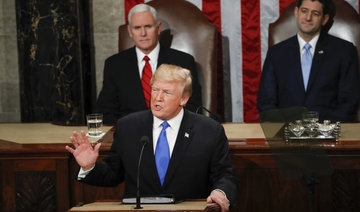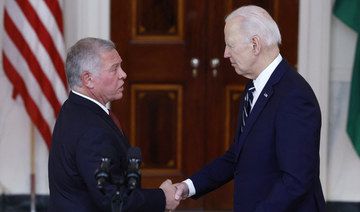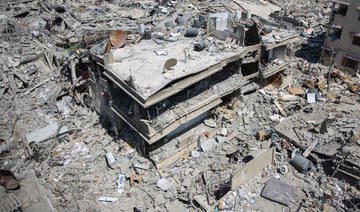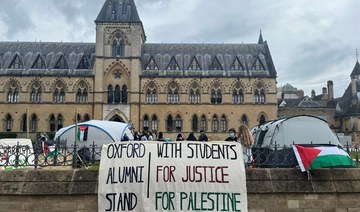WASHINGTON: The Trump administration on Friday announced it will continue much of the Obama administration’s nuclear weapons policy, but take a more aggressive stance toward Russia. It said Russia must be convinced it would face “unacceptably dire costs” if it were to threaten even a limited nuclear attack in Europe.
The sweeping review of US nuclear policy does not call for any net increase in strategic nuclear weapons — a position that stands in contrast to President Donald Trump’s statement, in a tweet shortly before he took office, that the US “must greatly strengthen and expand its nuclear capability until such time as the world comes to its senses regarding nukes.” In his State of the Union address Tuesday, he made no mention of expansion, though he said the arsenal must deter acts of aggression.
A 74-page report summarizing the review’s findings calls North Korea a “clear and grave threat” to the US and its allies. It asserts that any North Korean nuclear attack against the US or its allies will result in “the end of that regime.”
It also cast China as a potential nuclear adversary, saying the US arsenal is tailored to “prevent Beijing from mistakenly concluding” that it could gain advantage by using its nuclear weapons in Asia, or that “any use of nuclear weapons, however limited, is acceptable.”
The Pentagon-led review of the US nuclear arsenal and the policies that govern it was ordered by Trump a year ago. In a written statement, Trump said US strategy is designed to make use of nuclear weapons less likely. In an apparent reference to the threat of catastrophic cyberattack, he said the US aims to strengthen deterrence of major attacks against the US and its allies, including those that “may not come in the form of nuclear weapons.”
Known officially as a nuclear posture review, and customarily done at the outset of a new administration, the report drew blistering criticism from arms control groups.
“President Trump is embarking on a reckless path — one that will reduce US security both now and in the longer term,” said Lisbeth Gronlund, a senior scientist at the Union of Concerned Scientists. She said the administration is blurring the line between nuclear and conventional war-fighting.
The Trump administration concluded that the US should largely follow its predecessor’s blueprint for modernizing the nuclear arsenal, including new bomber aircraft, submarines and land-based missiles. It also endorsed adhering to existing arms control agreements, including the New START treaty that limits the United States and Russia each to 1,550 strategic nuclear warheads on a maximum of 700 deployed launchers.
The treaty, negotiated under President Barack Obama, entered into force on Feb. 5, 2011, and its weapons limits must be met by Monday. The US says it has been in compliance with the limits since August and it expects the Russians to comply by Monday’s deadline. As of Sept. 1, the last date for which official figures are available, Russia was below the launcher limit but slightly above the warhead limit, at 1,561.
“Moscow has repeatedly stated its intention to meet those limits on time, and we have no reason to believe that that won’t be the case,” State Department spokeswoman Heather Nauert said Thursday.
The Pentagon’s nuclear review concluded that while arms control can advance American interests, “further progress is difficult to envision,” in light of what the US considers Russia’s aggression in Ukraine and violations of existing arms deals. Administration officials briefed Russian and Chinese officials Friday prior to the review’s public release.
The Trump nuclear doctrine breaks with Obama’s in ending his push to reduce the role of nuclear weapons in US defense policy. Like Obama, Trump would consider using nuclear weapons only in “extreme circumstances,” while maintaining a degree of ambiguity about what that means. But Trump sees a fuller deterrent role for these weapons, as reflected in the plan to develop new capabilities to counter Russia in Europe.
The administration’s view is that Russian policies and actions are fraught with potential for miscalculation leading to an uncontrolled escalation of conflict in Europe. It specifically points to a Russian doctrine known as “escalate to de-escalate,” in which Moscow would use or threaten to use smaller-yield nuclear weapons in a limited, conventional conflict in Europe in the belief that doing so would compel the US and NATO to back down.
“Recent Russian statements on this evolving nuclear weapons doctrine appear to lower the threshold for Moscow’s first-use of nuclear weapons,” the review said.
The administration proposes a two-step solution.
First, it would modify “a small number” of existing long-range ballistic missiles carried by Trident strategic submarines to fit them with smaller-yield nuclear warheads. John Rood, the undersecretary of defense for policy, declined to provide an estimate of the cost, saying it would be partially included in the 2019 budget that will be submitted to Congress later this month. He said the missile would be fielded “in the near term,” but he refused to be more specific.
Second, “in the longer term,” the administration would develop a nuclear-armed sea-launched cruise missile — re-establishing a weapon that existed during the Cold War but was retired in 2011 by the Obama administration.
Robert Soofer, a senior nuclear policy official at the Pentagon who helped direct the policy review, said Moscow is likely to push back on the US plan for fielding those two additional weapons.
“I’m sure they won’t respond well,” Soofer said Thursday.
The press secretary at the Russian Embassy in Washington, Nikolay Lakhonin, did not immediately respond to a request for comment.
Trump nuclear doctrine takes tougher stance on Russia
Trump nuclear doctrine takes tougher stance on Russia
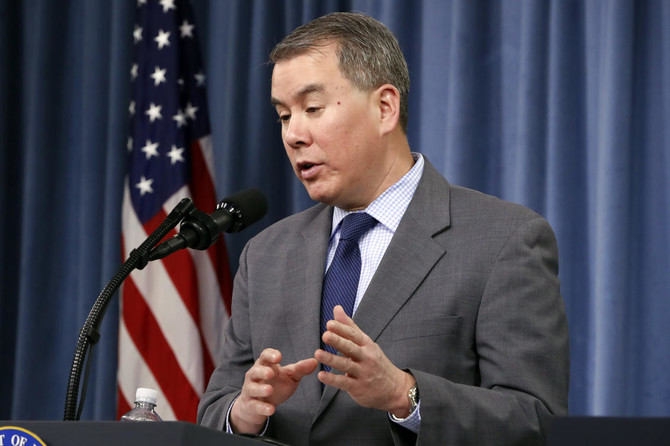
UK military personnel’s data accessed in hack, BBC reports

- MPs could be informed about the development in the Commons on Tuesday
Some personal information in a payroll system used by Britain’s defense department has been accessed in a data breach, the BBC reported on Monday.
The system was managed by an external contractor and no operational Ministry of Defense data was obtained, the broadcaster said, adding that the department took the system off-line immediately.
Information like names and bank details of current and some former members of the Royal Navy, Army and Air Force was compromised, according to the report.
The Ministry of Defense did not immediately respond to a Reuters’ request for comment outside working hours.
MPs could be informed about the development in the Commons on Tuesday, the report added.
Columbia University cancels main commencement after weeks of pro-Palestinian protests

- Israel has killed more than 34,600 Palestinians, about two-thirds of them women and children, according to the Health Ministry in the Hamas-ruled territory
- Similar encampments sprouted up elsewhere as universities struggled with where to draw the line between allowing free expression while maintaining safe and inclusive campuses
NEW YORK: Columbia University canceled its large university-wide commencement ceremony Monday following weeks of pro-Palestinian protests that have roiled its campus and others across the US, but said students will still be able to celebrate at a series of smaller, school-based ceremonies this week and next.
The decision comes as universities around the country wrangle with how to handle commencements for students whose high school graduations were derailed by COVID-19 in 2020. Another campus shaken by protests, Emory University, announced Monday that it would move its commencement from its Atlanta campus to a suburban arena. Others, including the University of Michigan, Indiana University and Northeastern, have pulled off ceremonies with few disruptions.
Columbia’s decision to cancel its main ceremonies scheduled for May 15 saves its president, Minouche Shafik, from having to deliver a commencement address in the same part of campus where police dismantled a protest encampment last week. The Ivy League school in upper Manhattan said it made the decision after discussions with students.
“Our students emphasized that these smaller-scale, school-based celebrations are most meaningful to them and their families,” officials said.
Most of the ceremonies that had been scheduled for the south lawn of the main campus, where encampments were taken down last week, will take place about 5 miles (8 kilometers) north at Columbia’s sports complex, officials said.
Speakers at some of Columbia’s still-scheduled graduation ceremonies include Pulitzer Prize-winning playwright James Ijames and Dr. Monica Bertagnolli, director of the National Institutes of Health.
Columbia had already canceled in-person classes. More than 200 pro-Palestinian demonstrators who had camped out on Columbia’s green or occupied an academic building were arrested in recent weeks.
Similar encampments sprouted up elsewhere as universities struggled with where to draw the line between allowing free expression while maintaining safe and inclusive campuses.
The University of Southern California earlier canceled its main graduation ceremony. Students abandoned their camp at USC on Sunday after being surrounded by police and threatened with arrest.
Other universities have held graduation ceremonies with beefed-up security. The University of Michigan’s ceremony was interrupted by chanting a few times Saturday. In Boston on Sunday, some students waved small Palestinian or Israeli flags at Northeastern University’s commencement in Fenway Park.
Emory’s ceremonies scheduled for May 13 will be held at the GasSouth Arena and Convocation Center in Duluth, almost 20 miles (30 kilometers) northeast of the university’s Atlanta campus, President Gregory Fenves said in an open letter.
“Please know that this decision was not taken lightly,” Fenves wrote. “It was made in close consultation with the Emory Police Department, security advisers and other agencies — each of which advised against holding commencement events on our campuses.”
The 16,000-student university is one of many that has seen repeated protests stemming from the conflict that started Oct. 7 when Hamas militants attacked southern Israel, killing about 1,200 people, mostly civilians, and taking roughly 250 hostages. Student protesters are calling on their schools to divest from companies that do business with Israel or otherwise contribute to the war effort.
Vowing to destroy Hamas, Israel launched an offensive in Gaza that has killed more than 34,500 Palestinians, about two-thirds of them women and children, according to the Health Ministry in the Hamas-ruled territory. Israeli strikes have devastated the enclave and displaced most of its inhabitants.
Hamas on Monday announced its acceptance of an Egyptian-Qatari ceasefire proposal, but Israel said the deal did not meet its “core demands” and that it was pushing ahead with an assault on the southern Gaza town of Rafah.
“Ceasefires are temporary,” said Selina Al-Shihabi, a Georgetown University sophomore who was taking part in a protest at George Washington. “There can be a ceasefire, but the US government will continue to arm the Israeli military. We plan to be here until the university divests or until they drag us out of here.”
Also Monday, the University of California, Los Angeles, alerted students that all classes were moving online due to ongoing disruptions following the dismantling of a pro-Palestinian encampment last week. The university police force reported 44 arrests but there were no specific details, UCLA spokesperson Eddie North-Hager said in an email to The Associated Press.
At the University of California, San Diego, police cleared a pro-Palestinian encampment and arrested more than 64 people, The San Diego Union-Tribune reported.
Schools are trying various tactics from appeasement to threats of disciplinary action to get protesters to take down encampments or move to campus areas where demonstrations would be less intrusive.
The School of the Art Institute of Chicago said in a Facebook post Sunday that it offered protesters “amnesty from academic sanction and trespassing charges” if they moved.
“Many protesters left the premises of their own accord after being notified by the police that they were trespassing and subject to arrest,” the school said. “Those that remained were arrested after multiple warnings to leave, including some of whom we recognized as SAIC students.”
A group of faculty and staff members at University of North Carolina at Chapel Hill asked the administration for amnesty for any students who were arrested and suspended during recent protests. UNC Faculty and Staff for Justice in Palestine said in a media advisory that it would deliver a letter on behalf of more than 500 faculty who support the student activists.
Other universities took a different approach.
Harvard University’s interim president, Alan Garber, warned student’s that those participating in a pro-Palestinian encampment in Harvard Yard could face “involuntary leave.” That means they may would not be allowed on campus, could lose their student housing and may not be able to take exams, Garber said.
At the Massachusetts Institute of Technology, police restricted access to an encampment after a school deadline for them to leave had passed. About 200 protesters gathered outside the camp, chanting, “MIT can’t you see? Palestine will be free” and other slogans.
Russia says it takes control of two more settlements in eastern Ukraine
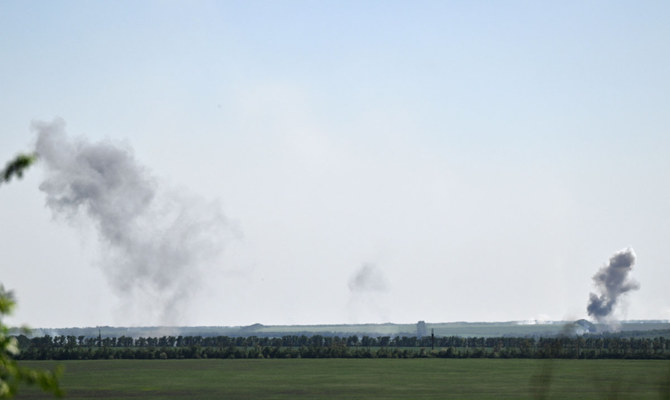
- Russia has made slow but steady advances since taking Avdiivka in February, with a string of villages in the area falling to Moscow’s forces
MOSCOW: Russian forces have taken control of the settlements of Soloviove in Ukraine’s eastern Donetsk region and Kotliarivka further north in the Kharkiv region, the defense ministry said on Monday.
Ukraine’s military made no mention of either locality in its evening General Staff report. Kharkiv Regional Governor Oleh Syniehubov said on Monday that Kotliarivka, located near the town of Kupiansk, was one of several locations to come under Russian shelling.
But Ukrainian bloggers appeared to acknowledge that both villages were in Russian hands.
DeepState, a popular forum on the war, noted on Saturday that Kotliarivka had been captured by Russian forces and on Sunday said the neighboring village of Kyslivka was also in Russian hands.
DeepState reported that Soloviove, northwest of the Russian-held town of Avdiivka, had been taken by Russian forces last week.
Russia has made slow but steady advances since taking Avdiivka in February, with a string of villages in the area falling to Moscow’s forces.
UNICEF warns 600,000 children face ‘catastrophe’ in Rafah
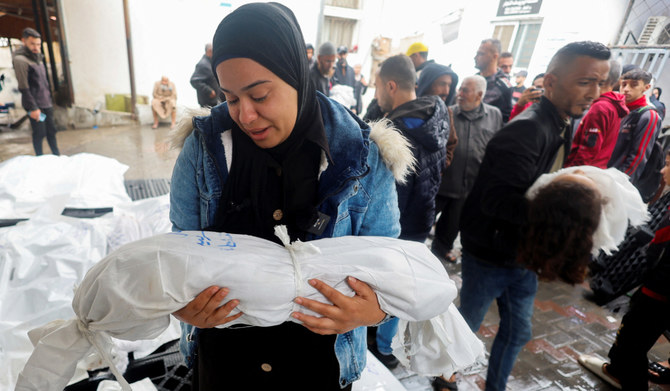
- Calling again for a ceasefire and safe access for humanitarian organizations, the agency highlighted there are some 78,000 infants under age two sheltering in the city, along with 175,000 children under five who are affected by infectious disease
- Israel has killed more than 34,000 Palestinians in Gaza, mostly women and children, according to the health ministry in the Hamas-run territory
NEW YORK: Some 600,000 children packed into Gaza’s Rafah city face “further catastrophe,” UNICEF warned on Monday, urging against their forced relocation after Israel ordered an evacuation ahead of its long-threatened ground invasion.
“Given the high concentration of children in Rafah ... UNICEF is warning of a further catastrophe for children, with military operations resulting in very high civilian casualties and the few remaining basic services and infrastructure they need to survive being totally destroyed,” the UN children’s agency said in a statement.
It said Gaza’s youth were already “on the edge of survival,” with many in Rafah — where the agency said the population has soared to 1.2 million people, half of them children — already displaced multiple times and with nowhere else to go.
“More than 200 days of war have taken an unimaginable toll on the lives of children,” said UNICEF Executive Director Catherine Russell.
“Rafah is now a city of children, who have nowhere safe to go in Gaza,” she said, warning that a large-scale military operation by Israel would bring “chaos and panic, and at a time where (children’s) physical and mental states are already weakened.”
UNICEF estimates that Rafah’s population has swelled to nearly five times its normal figure of 250,000 residents.
Calling again for a ceasefire and safe access for humanitarian organizations, the agency highlighted there are some 78,000 infants under age two sheltering in the city, along with 175,000 children under five who are affected by infectious disease.
Gaza’s bloodiest-ever war began following Hamas’s unprecedented Oct. 7 attack on Israel.
Israel has conducted a retaliatory offensive that has killed at least 34,735 people in Gaza, according to the Hamas-run
territory’s Health Ministry.
Of that toll, more than 14,000 are children, the ministry has said.
Israeli Prime Minister Benjamin Netanyahu has vowed to send ground troops into Rafah regardless of any truce, despite concerns from the US, other countries, and aid groups.
Hamas official Izzat Al-Rashiq said in a statement that any Israeli operation in Rafah would put the truce talks in jeopardy.
Senior Hamas official Sami Abu Zuhri said the evacuation order was a “dangerous escalation” that would have consequences.
“The US administration, alongside the occupation, bears responsibility for this terrorism,” the official said.
Hamas said later in a statement that any offensive in Rafah would not be a “picnic” for Israeli forces and said it was fully prepared to defend Palestinians there.
Aid agencies have warned that the evacuation order will lead to an even worse humanitarian disaster in the crowded coastal enclave of 2.3 million people reeling from seven months of war.
“Forcing 1 million displaced Palestinians from Rafah to evacuate without a safe destination is not only unlawful but would lead to catastrophic consequences,” British charity ActionAid said.
Nick Maynard, a British surgeon trying to leave Gaza on Monday, said in a voice message from the Gaza side of the Rafah crossing into Egypt: “Two huge bombs have just gone off immediately outside the crossing. There’s a lot of gunfire as well about 100 meters from us. We are very unclear whether we will get out.”
“Driving through Rafah, the tension was palpable with people evacuating as rapidly as they could.”
Witnesses said the areas in and around Rafah where Israel wants to move people are already crowded with little room for more tents.
“The biggest genocide, the biggest catastrophe, will take place in Rafah. I call on the whole Arab world to interfere for a ceasefire — let them interfere and save us from what we are in,” said Aminah Adwan, a displaced Palestinian.
Israel has been threatening to launch incursions in Rafah, which it says harbors thousands of Hamas fighters and potentially dozens of hostages.
Victory is impossible without taking Rafah, it says.
New York’s Columbia University cancels graduation ceremony as students remain defiant

- Pro-Palestinian protests put paid to event planned for May 15
NEW YORK: New York’s prestigious Columbia University has announced that it is canceling its main graduation ceremony, scheduled for next week, because of ongoing pro-Palestinian protests.
The announcement on Monday is the latest development in a movement that began nearly three weeks ago at Columbia and has swept college campuses nationwide.
The graduation ceremony had been scheduled for May 15 on the south lawn of the Manhattan campus, where protest encampments had been based before authorities dismantled them last week.
The Ivy League institution said it would “forego the university-wide ceremony” and hold a series of smaller events instead.
“We are determined to give our students the celebration they deserve, and that they want,” Columbia announced, saying “smaller-scale, school-based celebrations are most meaningful to them and their families.”
The university added: “We will focus our resources on those school ceremonies and on keeping them safe, respectful, and running smoothly. A great deal of effort is already underway to reach that goal.”
Students across the US have protested and set up tents at dozens of universities to register their opposition to the war in Gaza, while calling on President Joe Biden to do more to stop the bloodshed.
They have also demanded their institutions cease supporting companies that support Israel’s government.
Maya James, a psychology student at Columbia, told Arab News: “Seeing the university’s really insane response to student protests has brought so many people together, because I feel like most people on this campus can agree, including faculty, that students should not be penalized for expressing their First Amendment rights to protest, to petition, to do all of these things we’ve been encouraged to do for so long.”
She called on the university to give amnesty to students who had been suspended for expressing their First Amendment rights, which protect freedom of speech, the press, assembly, and the right to petition.
James also called on the university to disclose its investments because as “of right now there’s no visibility for us students to be able to know what the university is expected to do.”
She described the “vibes” at the protest sites as “absolutely remarkable,” with cultural and educational programs being offered and all kinds of activities being held.
She said the demonstrations were a continuation of Columbia’s long tradition of protest which began in the 1960s with its opposition to the involvement of the US in the Vietnam War.
James said it was “incredible” to see the solidarity for the Palestinian cause spread in campuses across the US, and people pushing to ensure “that we do indeed see a free Palestine within our lifetime and that our universities are no longer complicit in the genocide.”
Demonstrators have gathered on at least 40 US university campuses since April 17, often erecting tent camps to protest against the soaring death toll in the Gaza Strip. Nearly 2,000 people have been detained, according to the US media.
Police officers have forcibly ended several student sit-ins in recent days, including one at New York University at the request of its administrators.
Demonstrators had barricaded themselves inside Columbia, the epicenter of student protests in New York, and some complained about police brutality when officers cleared the faculty.
(With Agencies)


